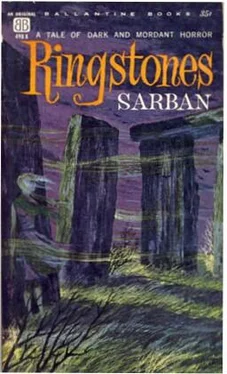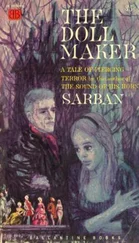Сарбан - Ringstones
Здесь есть возможность читать онлайн «Сарбан - Ringstones» весь текст электронной книги совершенно бесплатно (целиком полную версию без сокращений). В некоторых случаях можно слушать аудио, скачать через торрент в формате fb2 и присутствует краткое содержание. Жанр: Ужасы и Мистика, на английском языке. Описание произведения, (предисловие) а так же отзывы посетителей доступны на портале библиотеки ЛибКат.
- Название:Ringstones
- Автор:
- Жанр:
- Год:неизвестен
- ISBN:нет данных
- Рейтинг книги:3 / 5. Голосов: 1
-
Избранное:Добавить в избранное
- Отзывы:
-
Ваша оценка:
- 60
- 1
- 2
- 3
- 4
- 5
Ringstones: краткое содержание, описание и аннотация
Предлагаем к чтению аннотацию, описание, краткое содержание или предисловие (зависит от того, что написал сам автор книги «Ringstones»). Если вы не нашли необходимую информацию о книге — напишите в комментариях, мы постараемся отыскать её.
Ringstones — читать онлайн бесплатно полную книгу (весь текст) целиком
Ниже представлен текст книги, разбитый по страницам. Система сохранения места последней прочитанной страницы, позволяет с удобством читать онлайн бесплатно книгу «Ringstones», без необходимости каждый раз заново искать на чём Вы остановились. Поставьте закладку, и сможете в любой момент перейти на страницу, на которой закончили чтение.
Интервал:
Закладка:
“Bobby!” she cried. “You did post that letter I gave you on Monday, didn't you?”
The child, put on his guard and all his natural mistrust of adults roused by this concentration of attention, tried to divert it by skipping the direct question with a brief nod and immediately seeking to interest us in a project, of which he seemed to have information, to make the green Sheepcar buses extend their service to Staineshead. I sympathised with this gallant but hopeless attempt to create a diversion. A few more years would teach him that there's nothing so pertinacious as a woman intent on fixing responsibility for a lapse. Reluctantly, therefore, he abandoned the bus subject and admitted that he had posted the letter.
“Yes, but when?” Daphne persisted. “Yesterday,” came the sorry confession.
Daphne gasped, “Oh, Bobby!” and looked up at us, blushing with comical guilt.
“I forgot it on Monday, but I remembered it yesterday morning and I did post it all right,” Bobby volunteered, finding explanation easier after an admission of the fact.
I don't think Piers wanted to catch my eye just then. The thought of the postman delivering the simple solution of all the mystery Piers had elaborated, probably at the very moment when he stood staring with a wild surmise at the mournful solitude of Ringstones Hall, was too much for me. My laughter puzzled Mrs. Hancock and it made Daphne's warm cheek glow the brighter.
“So that's why you came!” she said, as the full enormity of the misunderstanding sank in. “And you've been all that way to Ringstones! Oh dear, what an ass I was. But I can explain it all....”
“I was just going to suggest that you might explain it over tea,” said Mrs. Hancock, pleasantly. “Shall we go along?”
(3)
Mrs. Hancock's husband, she told me before we reached the house, was a doctor with his practice in Staineshead. The two young girls were the daughters of an Egyptian doctor, a friend of Dr. Hancock, who, it seems, had spent most of the war in Egypt. They were at school in England and had been spending the summer holiday with the Hancocks. Mrs. Hancock had thought it a good idea to get someone to come for the summer who could both help to look after the children and give them some tuition in English. It so happened that Dr Hancock had an old friend who was a lecturer at Towerton College and he had written to her on the chance that the job might interest one of the Towerton girls.
The Egyptian girls, Farida and Na'ima, were shy. They spoke English quite well, but only giggled when I spoke to them in Arabic. That, perhaps, is scarcely to be wondered at. I know only classical Arabic, which, I've no doubt, I speak with a Cambridge accent, and I have very little idea what barbarous corruptions may pass for Arabic in the mouths of present−day Egyptians. But here, at any rate, I thought, was another of Daphne's sources; and Na'ima's name solved the puzzle of the “'ain”.
The Hancocks' house was a big one, with a spacious garden and a fine view of the moorland hills. Dr Hancock, who was waiting for us to begin tea, was a brisk, smart, jovial grey−haired little man, who could well have been the original of Daphne's Dr Ravelin. I was interested in his books, which filled many shelves round the big sitting−room where we had tea. He was not long in enquiring what we were reading at Cambridge, and soon he and I were well away on the subject of oriental languages. He seemed to have a fair command of colloquial Egyptian and some acquaintance with the written language. The little girls understood his Arabic all right and talked it back at him, and I'm afraid that in the interest of tracking down the classical origins of their dialect forms I rather forgot about Daphne's story. Incidentally, though, I had noticed that the doctor's library covered a pretty wide range, and among all sorts of scientific books there were a good few on anthropology and archaeology, including an abridged edition of The Golden Bough and several of Elliot Smith's and Perry's works.
Daphne did not begin to explain her story until the children had slipped away to play, and then she seemed to have such difficulty in beginning that Dr Hancock took the task on for her. He had laughed delightedly when he heard that we had actually gone to Ringstones Hall expecting to find her there.
“I know Ringstones well enough,” he said. “I was born and brought up in this district. It was a fine old place once upon a time. My father was in practice in Neatsbridge when he was a young man and he used to go and visit at Ringstones. I've heard him tell how he used to drive up to Blagill and over the moor in his dog−cart to dine with old Dr Ravelin—he was a doctor of Divinity, not Medicine—and back again in the pitch−dark night, with a skin full of port−wine and a head full of tales about pixies and hobgoblins and ancient Britons and Romans and Picts and I don't know what. Old Ravelin was an antiquarian and a folklorist, and he and my father used to go at it hammer and tongs about the local legends which my father, being brought up on scientific principles, would try to find natural origins for, while old Ravelin, it seems, was all for the supernatural.
“That was before I was born. Even in those days a place like Ringstones cost a lot to maintain, and I suppose old Ravelin found it too much for his means. At any rate he shut the place up and went abroad and died abroad. It passed to his heir, a grand−nephew, I believe, who was in the Indian Army. Captain Wrightson, he was called. There was a family of Wrightsons at Neatsbridge. I used to stare at their memorial tablets in the Parish Church on Sundays when I was a boy. But they've all died out long since. This Captain Wrightson was not known here. Whether he ever came and looked at the old place I don't quite know. It's likely enough that he had the idea of settling at Ringstones when he retired from the Army, but that never came about. The house was left with a couple of caretakers in it, a man and his wife that Wrightson sent up from London, and George Iddenden's father at Blagill rented the park for grazing. Then Captain Wrightson was killed: broke his neck in a riding accident. I remember hearing of that. I suppose I should be nineteen or twenty at the time. It was not long before my father died. Captain Wrightson had no children. I suppose his executors must have tried to sell the place as it stood, but no one would buy so remote an old place as that. It's too isolated and inconvenient for anyone nowadays. I say nowadays, but it's thirty years since. Still, even then people wanted something a bit more modern than Ringstones! Bit by bit they sold what was saleable: the furniture and all the old panelling and woodwork, and in the end the Iddendens bought the place for the grazing land, and some shooting syndicate which has since gone bust bought the moor. Some of the stuff was bought up locally. That Koweit chest in the hall came from there, and we have a few other bits of things.
“Well, that was the state of the place when I began to practise here in Staineshead twenty years ago. There used to be quite a good footpath over the moor from here to Blagill, and sometimes I used to go for a walk that way and have a look at Ringstones.”
Daphne now chimed in:
“I'd heard all about Ringstones, you see, from Dr Hancock. It sounded an interesting place and I thought I should like to see it....”
“So we went,” said Dr Hancock. He looked at Piers and me with an enquiring lift of his brows. “I suppose that's the adventure she told you about?”
Daphne looked at us all uncomfortably. “Well, no,” she began, but Piers helped her out by asking the doctor to give us his version of their trip to Ringstones first. The doctor looked rather surprised, but then, quickly grasping that this was more complicated than he had thought, gave us a short and precise account of their walk.
Читать дальшеИнтервал:
Закладка:
Похожие книги на «Ringstones»
Представляем Вашему вниманию похожие книги на «Ringstones» списком для выбора. Мы отобрали схожую по названию и смыслу литературу в надежде предоставить читателям больше вариантов отыскать новые, интересные, ещё непрочитанные произведения.
Обсуждение, отзывы о книге «Ringstones» и просто собственные мнения читателей. Оставьте ваши комментарии, напишите, что Вы думаете о произведении, его смысле или главных героях. Укажите что конкретно понравилось, а что нет, и почему Вы так считаете.



